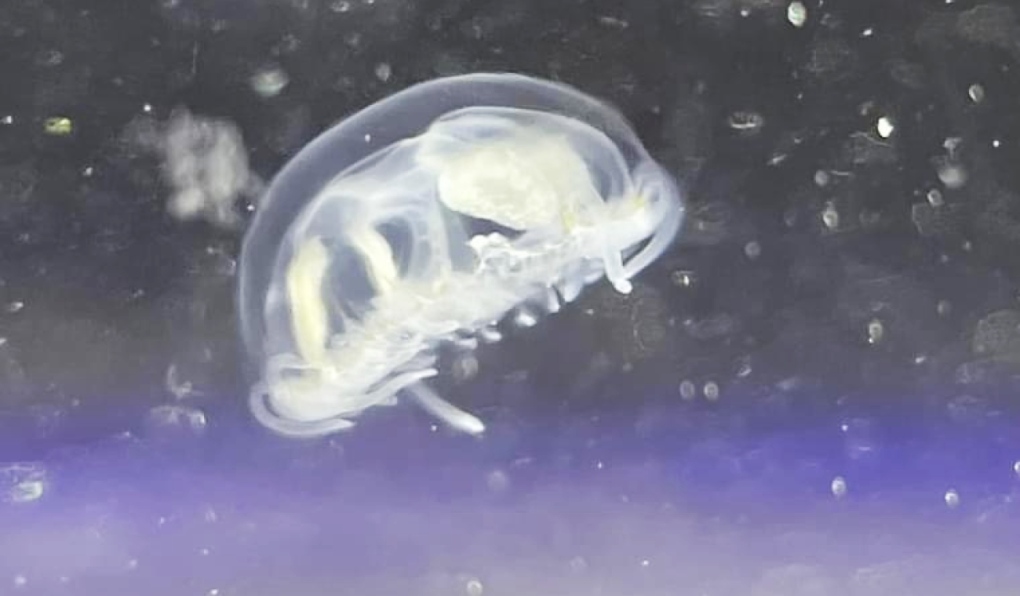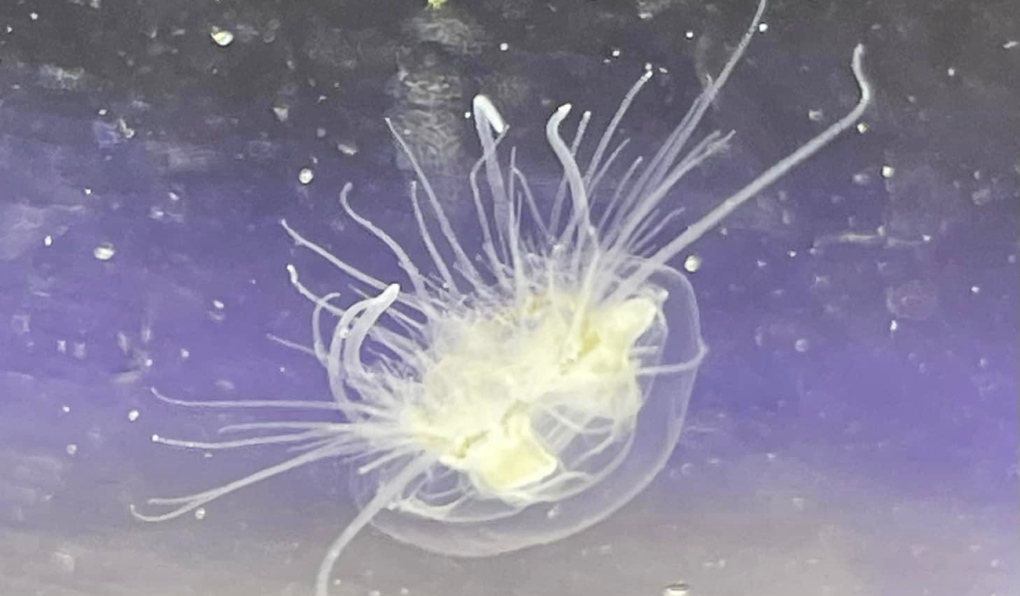Invasive jellyfish species spotted in northern Ontario lake for the first time
For the last 70 years, an invasive species from China has been slowly making its way north. In the last few weeks, it finally arrived in Sudbury, Ont.
Freshwater jellyfish were first reported in the Great Lakes about 70 years ago, with sightings emerging over the years from Manitoulin Island and Espanola.
More recently, scuba divers Jason Fox and Robert Harris spotted them in Ramsey Lake in the Bell Grove area of the water Aug. 26. Harris spotted them first.
"We were diving at Bell Grove beach, which is our kind of go-to spot for a quick dive in Sudbury without driving out of town," said Fox, an instructor at The Scuba Shop in Sudbury.
"(Harris) kinda' actually cupped his hands to show me and then when he opened his hands, it was gone."
The pair surfaced and Harris told him what he saw.
"He said, 'I swear I saw a jellyfish,'" Fox said.
"I thought, well, you know what, I remember seeing some news articles about them being spotted at Manitoulin."
Harris said he wasn't sure what it was at first.
"Sometimes you will see algae and the transparency of the algae might kinda' give the illusion of a jellyfish," he said. "So I think my first thought was maybe this is algae but when you see it doing its jellyfish thing, it was clearly jellyfish."
In the last couple of weeks, he and Fox been taking photos and videos of the photogenic, tiny creatures, which are about the size of a dime.
 This is the first time freshwater jellyfish have been reported in Ramsey Lake. They were first reported in the Great Lakes about 70 years ago, with sightings emerging over the years from Manitoulin Island and Espanola. (Photo courtesy of Jason Fox)
This is the first time freshwater jellyfish have been reported in Ramsey Lake. They were first reported in the Great Lakes about 70 years ago, with sightings emerging over the years from Manitoulin Island and Espanola. (Photo courtesy of Jason Fox)
They spotted more on subsequent dives and others in the lake reported seeing them, as well. So they contacted the Ministry of Natural Resources and Forestry to report what they saw -- and kept diving and taking photos.
"Sunday, we were out and we (saw) about 22, I think on the first dive," Fox said.
"And probably about 50 on the second dive that we did the same day. So we were really surprised to see that many. It was like, wow, this is strange but kind of cool."
They collected some in jars, something Fox said they ordinarily wouldn't have done.
"As divers, we are taught and teach others not to touch or take items or life from the water," he said.
"But when I knew they were invasive and I wanted proof, I figured a few in a bottle for proof wouldn’t hurt."
John Gunn, director of Laurentian University's Living With Lakes Centre, said reports of freshwater jellyfish are becoming more common. He said they eat plankton and there haven't been any reports of them doing harm.
"It's surprising to see them (in Ramsey)," Gunn said. "They're another immigrant moving around the world … They're more of a novelty than a nuisance."
Jeff Brinsmead, senior invasive species biologist with the Ministry of Natural Resources and Forestry, said the freshwater jellyfish arrived in Europe from China about 150 years ago and confirmed they have been reported in Canada for the last 70 years.
 This is the first time freshwater jellyfish have been reported in Ramsey Lake. They were first reported in the Great Lakes about 70 years ago, with sightings emerging over the years from Manitoulin Island and Espanola. (Photo courtesy of Jason Fox)
This is the first time freshwater jellyfish have been reported in Ramsey Lake. They were first reported in the Great Lakes about 70 years ago, with sightings emerging over the years from Manitoulin Island and Espanola. (Photo courtesy of Jason Fox)
Brinsmead said this is the first report he's heard that they are in Ramsey Lake.
"They are in 44 states in the U.S. as well, I believe, and five provinces," he said.
"In Canada, our first population that we're aware of showed up, as you mentioned, about 70 years ago, and that was not too far outside of Ottawa, and they've kind of been spreading around Ontario ever since."
Exactly how they arrived isn't certain, but it could be through bilge water, in bait buckets or by being stuck to other aquatic plants.
The creatures can remain polyps for years before maturing into tiny jellyfish. They can sting, but Brinsmead said they are so small, a bite would feel like a small scratch, if noticed at all.
While not much research has been done in Canada, studies in the U.S. have not found any proof that they cause harm to ecosystems, he said.
While they can remain as polyps for years, once they mature and become jellyfish, they only live for a month or so.
"Because of the short life stage as an adult, they probably aren't likely to (have) any effect on ecosystems," Brinsmead said.
When asked whether they will keep moving north, he said their path isn't linear. They have already been spotted in places like Thunder Bay and Hearst, but are likely to keep spreading.
For more information, click here.
-- With files from Alana Everson
CTVNews.ca Top Stories

Canadian family stuck in Lebanon anxiously awaits flight options amid Israeli strikes
A Canadian man who is trapped in Lebanon with his family says they are anxiously waiting for seats on a flight out of the country, as a barrage of Israeli airstrikes continues.
Suspect in shooting of Toronto cop was out on bail
A 21-year-old man who was charged with attempted murder in the shooting of a Toronto police officer this week was out on bail at the time of the alleged offence, court documents obtained by CTV News Toronto show.
Scientists looked at images from space to see how fast Antarctica is turning green. Here's what they found
Parts of icy Antarctica are turning green with plant life at an alarming rate as the region is gripped by extreme heat events, according to new research, sparking concerns about the changing landscape on this vast continent.
DEVELOPING 2 dead after fire rips through historic building in Old Montreal
At least two people are dead and others are injured after a fire ripped through a century-old building near Montreal's City Hall, sources told Noovo Info.
Yazidi woman captured by ISIS rescued in Gaza after more than a decade in captivity
A 21-year-old Yazidi woman has been rescued from Gaza where she had been held captive by Hamas for years after being trafficked by ISIS.
A 6-year-old girl was kidnapped in Arkansas in 1995. Almost 30 years later, a suspect was identified
Nearly 30 years after a six-year-old girl disappeared in Western Arkansas, authorities have identified a suspect in her abduction through DNA evidence.
Dolphins 'smile' at each other when they play and to avoid misunderstanding, study finds
For humans, flashing a smile is an easy way to avoid misunderstanding. And, according to a new study, bottlenose dolphins may use a similar tactic while playing with each other.
Pit bulls in B.C. pet mauling tested positive for meth, cocaine, says city
Three pit bulls involved in a deadly attack on another dog last month in Kamloops, B.C., tested positive for methamphetamine and cocaine, and the city is going to court to have them put down.
Tax rebate: Canadians with low to modest incomes to receive payment on Friday
Canadians who are eligible for a GST/HST tax credit can expect their final payment of the year on Friday.


































